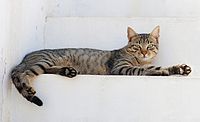
Photo from wikipedia
Pre-weaning diarrhea in mink kits (PWD), also known as "sticky kits" is a multifactorial syndrome of considerable concern in the mink production. Evidence based treatment protocols are not available, and… Click to show full abstract
Pre-weaning diarrhea in mink kits (PWD), also known as "sticky kits" is a multifactorial syndrome of considerable concern in the mink production. Evidence based treatment protocols are not available, and treatment is therefore empirical and often based on the use of antimicrobials. The purpose of the study was to test the effect of 3 alternative treatments to a standard antibiotic treatment, to characterize the study groups microbiologically, and finally to compare the intestinal microbiota of the different treatment groups at the age of 42 days. In total, 226 one to three week old mink kits with PWD from 36 litters were treated with either 1) Lactobacillus reuteri, 2) benzylpenicillin, 3) Ringer lactate or 4) amoxicillin (controls). Effects of the treatments were measured as weight gain from day 0 to day 15 and mortality. Multivariable linear mixed model regression showed no significant difference in weight gain between probiotic-, penicillin or fluid-treated mink kits and the amoxicillin treated controls. There was also no significant difference in mortality risk between the treatment groups. Bacterial culture and next generation sequencing of the viral contents showed that the study groups were uniform with a high frequency of Staphylococcus intermedius group (SIG) bacteria, Escherichia coli, Enterococcus hirae, Mamastrovirus and Sapovirus which were representative for mink kits with PWD. 16S sequencing results of the bacterial microbiota, when the kits were 42 days old were dominated by clostridia in all groups and showed no clear differences in the bacterial composition between the different treatment groups.
Journal Title: Research in veterinary science
Year Published: 2019
Link to full text (if available)
Share on Social Media: Sign Up to like & get
recommendations!